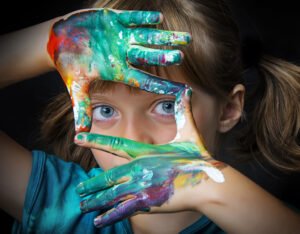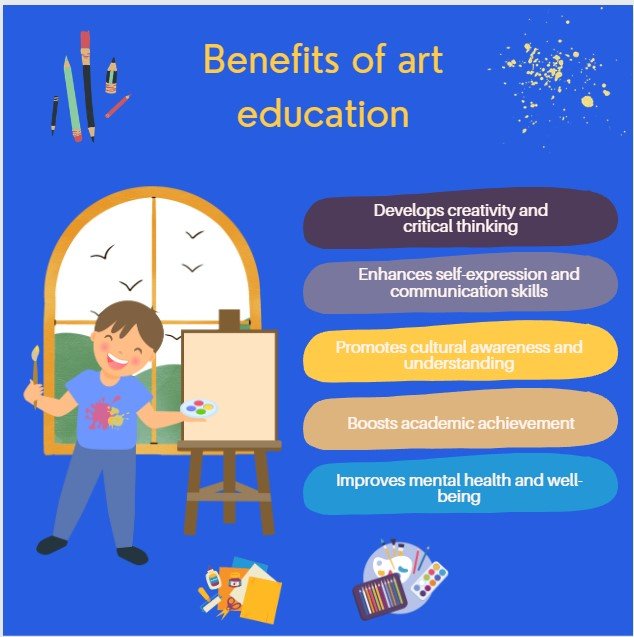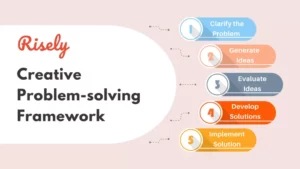|
Getting your Trinity Audio player ready...
|
Arts education stands as a beacon in shaping well-rounded individuals, fostering creativity, critical thinking, and cultural awareness. This article delves into the multifaceted Importance of Arts Education, exploring its impact on cognitive development, personal growth, and its role in preparing individuals for a dynamic and interconnected world.
Cognitive Development and Academic Achievement
To begin with, arts education serves as a cornerstone in cognitive development, enhancing skills such as problem-solving, pattern recognition, and spatial reasoning. Therefore, numerous studies link arts engagement to improved academic performance, showcasing the positive correlation between arts education and achievements in other subjects.

Importance of Arts Education
Creative Expression and Emotional Intelligence
Artistic endeavours provide a powerful outlet for creative expression, allowing individuals to convey emotions and ideas in unique ways. In addition, arts education nurtures emotional intelligence by encouraging students to explore and understand their feelings, fostering empathy and interpersonal skills essential for navigating diverse social landscapes.
Critical Thinking and Problem-Solving Skills
Moreover, engaging with the arts hones critical thinking skills by challenging individuals to analyse, interpret, and synthesise information. Problem-solving becomes an intuitive process as students navigate the complexities of artistic creation, translating into valuable skills applicable across various academic and real-world scenarios.
Cultural Awareness and Global Citizenship
Furthermore, arts education acts as a bridge to diverse cultures, fostering an appreciation for global perspectives and diverse artistic traditions. Exposure to different art forms cultivates cultural awareness, laying the foundation for individuals to become informed and empathetic global citizens in an increasingly interconnected world.
Fostering a Growth Mindset
To add on, the arts instill a growth mindset, emphasising the belief that abilities can be developed through dedication and effort. Hence, this mindset shift positively impacts academic and personal pursuits, empowering individuals to embrace challenges, learn from failures, and persist in the face of adversity.
Enhancing Communication Skills
Effective communication is a vital life skill, and arts education plays a pivotal role in honing this ability. Whether through visual arts, music, or drama, students learn to communicate ideas, emotions, and narratives, developing a nuanced and expressive communication style that extends beyond words.
Building Self-Confidence and Resilience
Furthermore, participation in arts activities nurtures self-confidence as individuals showcase their creations and performances. Hence,the constructive feedback and iterative nature of artistic processes instill resilience, teaching students that growth often stems from challenges and setbacks.
Cultivating a Sense of Identity
Arts education encourages self-discovery, helping individuals explore their identities and values. Whether through creative writing, visual arts, or performing arts, students develop a sense of self that contributes to a strong foundation for personal growth and identity formation.
Inspiring Innovation and Creativity
Innovation and creativity are vital drivers of progress in any society. Arts education sparks the flame of creativity, encouraging individuals to think outside conventional boundaries. Moreover, fostering innovation that transcends artistic domains and permeates various facets of life.
Promoting Inclusivity and Diversity
Art is a universal language that transcends cultural and linguistic barriers. Arts education promotes inclusivity by providing a platform for diverse voices and perspectives. It celebrates the richness of human experiences, fostering an environment that values and respects differences.
Connecting Learning Across Disciplines
Additionally, Arts education creates meaningful connections across disciplines, fostering interdisciplinary thinking. Integrating arts into traditional curricula enhances students’ understanding of complex concepts. Therefore, encouraging them to approach learning holistically and make interdisciplinary connections.
Civic Engagement and Social Responsibility
A well-rounded education in the arts cultivates a sense of civic engagement and social responsibility. Through community projects, collaborative performances, and artistic initiatives, students learn the importance of contributing positively to their communities, fostering a sense of social responsibility.
Resilience in the Face of Adversity
Engaging with the arts equips individuals with a unique toolset for navigating life’s challenges. Therefore, the ability to express emotions, think creatively, and persevere through artistic processes contributes to emotional resilience. Thus empowering individuals to cope effectively with adversity.
Lifelong Learning and Personal Enrichment
Arts education lays the foundation for a lifelong appreciation of creativity and learning. Beyond academic achievements, the skills cultivated through arts education endure, enriching individuals’ lives as they continue to explore, create, and appreciate the arts throughout their lifetimes.
The Role of Technology in Arts Education
Moreover, in the digital age, technology plays a significant role in expanding the reach and impact of arts education. Thus, online platforms, virtual exhibitions, and digital tools provide new avenues for artistic expression, making arts education more accessible and inclusive.
Advocacy for Arts Education
Lastly, as the importance of arts education becomes increasingly evident, advocacy efforts play a crucial role in ensuring its integration into educational systems. Hence, advocates champion policies that prioritise arts education, recognising its transformative impact on individuals and society.
Conclusion
In conclusion, in the tapestry of education, arts education emerges as a vibrant thread. Hence weaving together cognitive development, creativity, cultural awareness, and personal growth. Its far-reaching impact extends beyond academic achievements, nurturing individuals who contribute meaningfully to a diverse and interconnected world. As the educational landscape evolves, recognising and championing the importance of arts education remains essential for fostering well-rounded individuals poised to thrive in the complexities of the modern era.
You May Find This Information Useful:
Creativity Skills That Fuel Innovation and Imagination



